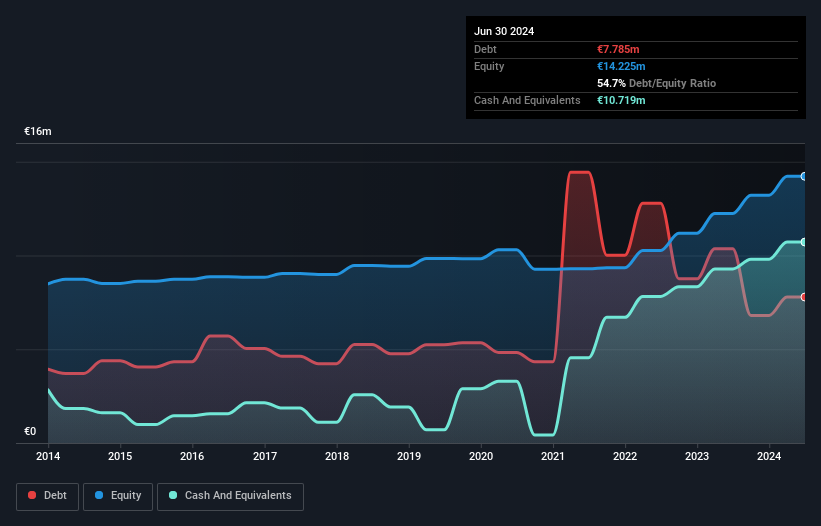We Think Park & Bellheimer (FRA:PKB) Can Stay On Top Of Its Debt

Warren Buffett famously said, 'Volatility is far from synonymous with risk.' When we think about how risky a company is, we always like to look at its use of debt, since debt overload can lead to ruin. We note that Park & Bellheimer AG (FRA:PKB) does have debt on its balance sheet. But the real question is whether this debt is making the company risky.
When Is Debt A Problem?
Generally speaking, debt only becomes a real problem when a company can't easily pay it off, either by raising capital or with its own cash flow. Part and parcel of capitalism is the process of 'creative destruction' where failed businesses are mercilessly liquidated by their bankers. While that is not too common, we often do see indebted companies permanently diluting shareholders because lenders force them to raise capital at a distressed price. Of course, the upside of debt is that it often represents cheap capital, especially when it replaces dilution in a company with the ability to reinvest at high rates of return. When we think about a company's use of debt, we first look at cash and debt together.
View our latest analysis for Park & Bellheimer
What Is Park & Bellheimer's Net Debt?
As you can see below, Park & Bellheimer had €7.79m of debt at June 2024, down from €10.4m a year prior. But it also has €10.7m in cash to offset that, meaning it has €2.93m net cash.

How Healthy Is Park & Bellheimer's Balance Sheet?
According to the last reported balance sheet, Park & Bellheimer had liabilities of €17.1m due within 12 months, and liabilities of €8.85m due beyond 12 months. Offsetting these obligations, it had cash of €10.7m as well as receivables valued at €4.67m due within 12 months. So it has liabilities totalling €10.5m more than its cash and near-term receivables, combined.
This is a mountain of leverage relative to its market capitalization of €11.0m. Should its lenders demand that it shore up the balance sheet, shareholders would likely face severe dilution. While it does have liabilities worth noting, Park & Bellheimer also has more cash than debt, so we're pretty confident it can manage its debt safely.
The good news is that Park & Bellheimer has increased its EBIT by 6.6% over twelve months, which should ease any concerns about debt repayment. The balance sheet is clearly the area to focus on when you are analysing debt. But you can't view debt in total isolation; since Park & Bellheimer will need earnings to service that debt. So if you're keen to discover more about its earnings, it might be worth checking out this graph of its long term earnings trend.
Finally, a company can only pay off debt with cold hard cash, not accounting profits. While Park & Bellheimer has net cash on its balance sheet, it's still worth taking a look at its ability to convert earnings before interest and tax (EBIT) to free cash flow, to help us understand how quickly it is building (or eroding) that cash balance. Happily for any shareholders, Park & Bellheimer actually produced more free cash flow than EBIT over the last three years. That sort of strong cash generation warms our hearts like a puppy in a bumblebee suit.
Summing Up
While Park & Bellheimer does have more liabilities than liquid assets, it also has net cash of €2.93m. And it impressed us with free cash flow of €3.9m, being 197% of its EBIT. So we are not troubled with Park & Bellheimer's debt use. There's no doubt that we learn most about debt from the balance sheet. But ultimately, every company can contain risks that exist outside of the balance sheet. We've identified 2 warning signs with Park & Bellheimer , and understanding them should be part of your investment process.
If you're interested in investing in businesses that can grow profits without the burden of debt, then check out this free list of growing businesses that have net cash on the balance sheet.
New: Manage All Your Stock Portfolios in One Place
We've created the ultimate portfolio companion for stock investors, and it's free.
• Connect an unlimited number of Portfolios and see your total in one currency
• Be alerted to new Warning Signs or Risks via email or mobile
• Track the Fair Value of your stocks
Have feedback on this article? Concerned about the content? Get in touch with us directly. Alternatively, email editorial-team (at) simplywallst.com.
This article by Simply Wall St is general in nature. We provide commentary based on historical data and analyst forecasts only using an unbiased methodology and our articles are not intended to be financial advice. It does not constitute a recommendation to buy or sell any stock, and does not take account of your objectives, or your financial situation. We aim to bring you long-term focused analysis driven by fundamental data. Note that our analysis may not factor in the latest price-sensitive company announcements or qualitative material. Simply Wall St has no position in any stocks mentioned.
About DB:PKB
Park & Bellheimer
Produces and distributes beer and non-alcoholic beverages in Germany.
Excellent balance sheet and good value.
Market Insights
Community Narratives



